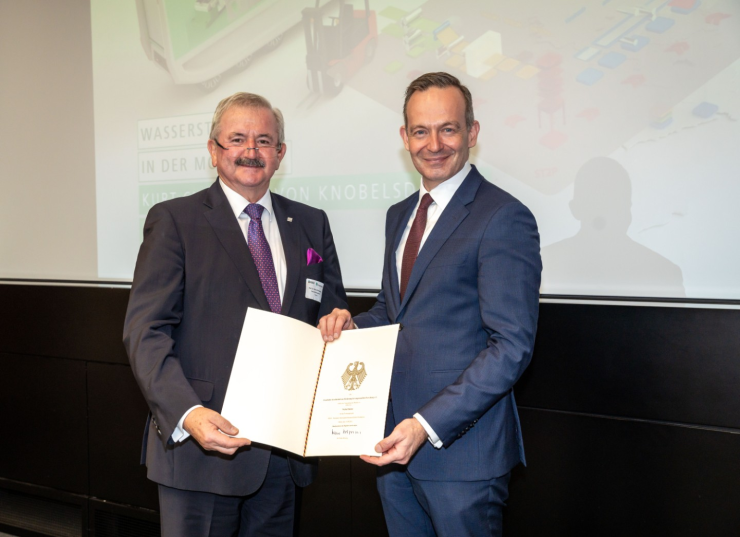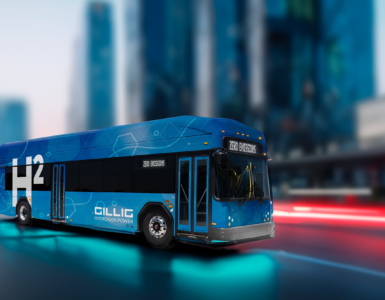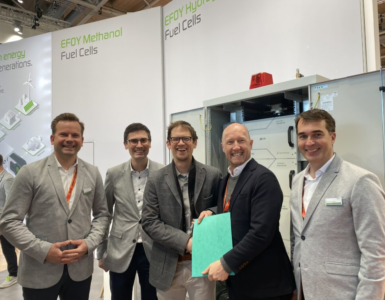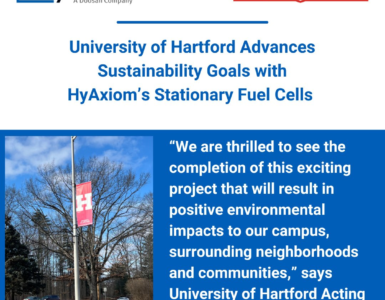Fraunhofer Institutes gets €80 million for fuel cell production.
In Berlin Federal Transport Minister Dr. Volker Wissing handed over the funding decision for around 80 million euros for “H2GO – National Action Plan for Fuel Cell Production”. H2GO bundles the activities of 19 Fraunhofer Institutes with the aim of significantly reducing CO2 emissions in load mobility.
The focus is on the development and rollout of industrial technologies for the economical production of fuel cells, primarily for road-based heavy goods traffic. The overall coordination of the research network with a total of five sub-networks lies with the Fraunhofer Institute for Machine Tools and Forming Technology IWU.
Increasing transport services in road freight transport ensure a continuous increase in CO2emissions in this segment – despite advances in fuel consumption and exhaust technology.
🔥 What about we co-host a webinar? Let's educate, captivate, and convert the hydrogen economy!
Hydrogen Central is the global go-to online magazine for the hydrogen economy, we can help you host impactful webinars that become a global reference on your topic and are an evergreen source of leads. Click here to request more details
The need to develop alternatives to fossil fuels is therefore particularly great in heavy-duty transport. 19 Fraunhofer Institutes are working hard to create the conditions for efficient large-scale production of fuel cells that convert hydrogen into electricity on board a vehicle.
The mission of the H2GO Action Plan is to develop technological solutions that enable a rapid ramp-up of fuel cell production.
Dr. Volker Wissing, Federal Minister for Digital Affairs and Transport, said:
The alliance with the Fraunhofer-Gesellschaft takes the development of fuel cell production to a new level.
“With our funding, we want to help generate marketable products in the field of fuel cell technology from successful research and development – and if possible on an industrial scale. The developed solutions are made available digitally to all partners involved in a virtual reference factory.”
“This strengthens the competitiveness of our domestic industry and makes a significant contribution to significantly reducing the costs of hydrogen vehicles in heavy-duty transport. We urgently need climate-friendly services here.”
Prof. Reimund Neugebauer, President of the Fraunhofer-Gesellschaft, said:
Hydrogen is a key element of the energy transition.
“In order for hydrogen to be able to assert itself as an energy carrier nationwide, it must be produced at market-based prices, in sufficient quantities and climate-neutrally and with high CO2reduction rate. In heavy-duty transport, this requires cost-effective, robust technologies for the economical production of fuel cells.”
H2Go will make a decisive contribution to the production of fuel cells economically and in industrial series. This will not only take us an important step forward in terms of climate policy, but will also make fuel cell production a central area of competence for Germany and Europe as a business location.””
Manufacturing technologies and processes must be upgraded for efficient, cost-effective and highly profitable industrial series production. H2GO will create the conditions for this through production research, development and preparation of industrial implementation.
Prof. Welf-Guntram Drossel, Managing Director of the Institute at Fraunhofer IWU, said:
H2GO is also aimed in particular at small and medium-sized companies that map the entire value chain of fuel cell production and close it up to the application in load mobility.
“This is about manufacturing expertise, but we also explicitly address the necessary mechanical and plant engineering.”
Fuel cell electric vehicles (FCEVs) will be able to play a major role in CO in the future2-neutral long-distance transport: From a technological point of view, the fuel cell offers similar volume and weight payloads with comparable ranges and refuelling times compared to today’s fossil drive technologies.
This means that freight forwarders retain the flexibility they are accustomed to today in truck use. Compared to other emission-free drives, FCEVs are competitive in terms of operation, economy and ecology, especially in heavy-duty transport – provided that a successful market ramp-up creates cost parity for hydrogen compared to fossil fuels.
In terms of industrial policy, hydrogen opens up a unique opportunity not only to promote climate protection and to broaden the energy supply in the mobility sector as well. For Germany as a production location, it can generate additional added value and thus an extensive, sustainable and future-proof business area.
H2GO will help to secure a significant share of the german economy in the highly dynamically developing global fuel cell market. A rapidly established fuel cell industry can thus become a central field of competence for German companies.
The action plan aims to connect industry and research into a strong ecosystem for economically sustainable fuel cell production in order to make fuel cell technology transparent, tangible and usable for society. H2GO will provide German industry with support on several levels to increase its productivity and innovative strength.
For example, a specially developed framework diversifies several transfer lines with various tailor-made modules that contain the basics for fuel cell production. Companies can participate in the information provided and thus develop their production elements. In addition, digital pilot lines are set up on the basis of virtual images of the production elements.
These offer great assistance for the efficient consideration of the value chain. There are also solutions for the process ramp-up of future series production that help to eliminate any start-up problems so that error-free production can be realized quickly.
Even recycling solutions and development projects for the generation of closed material cycles are part of the product portfolio.
This provides companies with a comprehensive package of products for the transition to mass-scale fuel cell production – from initial analysis to series production. H2GO also includes many possibilities to realize sampling, provisioning, manufacturing research and joint spin-offs in joint projects or direct cooperations.
The foundation of H2GO is formed by 19 Fraunhofer Institutes in a total of 9 federal states, which develop new manufacturing solutions in regional technology hubs with their research competencies and infrastructures as well as local networks.
These will be clustered in four technology sub-networks and specifically strengthened with the inclusion of numerous initiatives at state and federal level. A further, higher-level sub-network »Virtual Reference Factory« provides digital images of the developed production solutions and thus enables the synergetic integration in a virtual reference architecture for fuel cell production.
The funding period runs until the end of 2025, and the Federal Ministry of Digital Affairs and Transport is funding H2GO with around € 80 million from the funds of the Future Fund for the Automotive Industry in accordance with the recommendations of the Expert Committee.
The funding is coordinated by NOW GmbH, and Project Management Jülich (PtJ) is responsible for implementation.
Starting signal for the hydrogen age in load mobility, September 13, 2022








